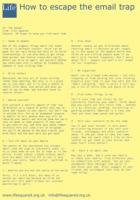1. Speak to people – one of the biggest things email has taken from us is personal contact, which can be good for our well-being and help us to build relationships. It can also help us get things done quicker and resolve issues more easily. Before you write an email, ask yourself whether you could deal with it better by telephoning someone or just visiting them.
2. Write letters – rediscover the lost art of letter writing rather than emailing. Not only is it a great way to slow down, but it is also a chance to really think about that person and what you want to say to them, and everyone loves to receive letters.
3. Ration yourself – give yourself a specific amount of time (say 20 minutes) at a couple of points each day to check and respond to your emails, but don’t log in outside this. Set up an automated response to emails to tell people when you will be checking your emails and telling them how you’d love to speak to them properly if they want to get hold of you, and note your phone number. Initially this will take a bit of willpower, but you’ll be amazed at how much clearer your mind feels and how much more you get done!
4. Turn off email on your mobile – the advent of the smartphone has brought email (and the urge to constantly check it) to us even when we are not at home or in the office. Either choose a phone without email, turn the email facility off or use it only within your daily ‘email ration’, outlined in point 3 above.
5. Realise you are not the centre of the world – sorry – it’s a bit blunt, but many of us overdo our emailing because we think the world will fall apart without our constant monitoring. It won’t.
6. Slow down – another reason we get distressed about checking email is because we get caught up in the speed of the modern world and think we are letting people down if we don’t give instant responses. Don’t worry about this - people can wait a bit longer for our responses.
7. Be organised – email can be a huge time waster – not only stopping us from working but also relaxing. Organise your time in your day well and the ‘email rationing’ idea in point 3 will buy you a lot of extra time and peace of mind.
8. Find other things to do – you’ll save time and stress by not constantly checking your email. Think about how you could use this extra time – whether it’s by relaxing, working, socialising or getting properly immersed in a task now that you have some peace and quiet!
9. Tell your contacts to do the same – you’ll get even further in this email de-cluttering process if you tell your friends, colleagues and other contacts about it and get them to take the same steps. Why not email them a link to this leaflet to get them to take action and make their lives better?
10. Have a no email day – one day a week, don’t send any emails or check your emails. Find different ways to communicate with people. Set up your automated reply message (see point 3) and enjoy your day. Also, suggest to your friends and colleagues that they do the same thing!
Life Squared 2011





